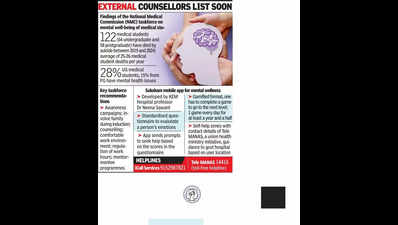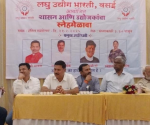State-TISS tieup for well-being of med students | Mumbai News – Times of India

Mumbai: In response to growing mental health concerns among young medical students, the state’s medical education and drugs department (MEDD) has collaborated with the premier Tata Institute of Social Sciences (TISS) to implement a range of initiatives designed to support students’ well-being across colleges in the state.
External counsellors will be made available in all medical colleges to offer professional support to students who are not comfortable visiting in-house psychiatry departments. These counsellors will be trained by TISS, Unicef, and Mariwala Health Foundation (MHF).
TISS, with its extensive experience in working with top institutions like IITs and NITs in training the trainers and building peer support systems, along with Unicef and Mariwala Health Foundation, will help the medical education department develop tailored training modules for educators and students.
These modules will equip educators with practical tools to incorporate mental health strategies into their everyday teaching and interaction. The department may design a policy that could be replicated in other institutions of higher learning too.
Some other initiatives taken at the department level will include regular yoga sessions on college campuses, recreational activities both indoors and outdoors, and a gamified mobile app to track and promote mental well-being. Medical education commissioner Rajeev Nivatkar said the department is keen on taking positive steps for the overall well-being of students and initiatives are being planned to achieve this goal.
Dr Aparna Joshi, TISS’ School of Human Ecology which manages iCall Services, said they plan to take a two-pronged approach to deal with the increase in mental health issues in medical colleges, referring to a recent report of a national task force. “We will help in building capacities of teachers and students, as they will be the first responders and should be equipped with basic understanding and skills to provide psychosocial support,” said Joshi.
The idea for the initiative came from the commissioner (medical education), said Dr Sarika Dakshikar, psychiatry department, Grant Govt Medical College (GGMC). The department will work towards building a resource list of counsellors who are not part of the college’s psychiatry department under Chhatra Manas Yojana, she said. Colleges have been asked to start yoga sessions for students at least once a week. Most have put up posters as part of the first phase on campus to create awareness, and help young doctors through free-of-cost mobile applications, for instance, Saksham, which was developed by Dr Neena Sawant from KEM Hospital, added Dr Dakshikar. Institutes will have anonymous suggestion boxes too.
DMER already conducted a pilot workshop in the last week of Dec with teachers from GGMC and J J Hospital to test the feasibility of the idea. The educators were trained in identifying the common signs of distress among students, through daily interaction, as many of the doctors are from different specialities and not necessarily from psychiatry. “We told them about the youth-friendly language that they can incorporate in their interaction and bridge the communication gap. There is also anxiety among teachers on the next step once distressed students are identified. Therefore, we are helping them build a good referral system with not only their in-house counsellors, but external ones too,” said Joshi.
Dr Sawant, who developed the app, said it has so far seen 1,000 downloads and requires govt support to upscale. She said the app currently incorporates resources from Maharashtra, Goa and Gujarat, is available in 3 languages and can be used by anyone.
















